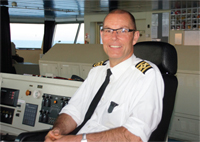Captain Eugene Favier, master of the Hull-Rotterdam ferry Pride of Hull, talks to Nicholas Leach about his career, his ship and working on the North Sea.
When did you start your career at sea? I went to sea in 1987 after four years at the Nautical College in Rotterdam, two years at school, one year apprenticeship and one year back at school. My apprenticeship was on the tanker Jo Cypress, and we sailed three times round Africa from Rotterdam, including going through the Suez Canal.
How did your career progress?As there were few jobs, I drove round Rotterdam shipping companies looking for work and ended up with the heavylift company Kahn Shipping, flying to Miami as a sailor as they needed a Second Mate, and I got the job. I worked for four years with that company sailing round the world wherever the work was, working five months on with only a month off. As I wanted more regular employment, I answered an advert with North Sea Ferries. I had an interview and was offered a job straight away on the freighter Norcape from Ipswich-Rotterdam.

What was your first command?I worked on North Sea Ferries and subsequent companies, including P&O North Sea Ferries, and was involved with Pride of Hull and Rotterdam when they were being built. I was based in Italy during the building of Pride of Rotterdam and sailed on her as Chief Officer while training to be Master, so my first Master’s role was on Pride of Rotterdam. I have switched round various ships lately, being on Pride of Bruges, Pride of Rotterdam and also Pride of Hull. I am the flexible Master and work on the different ships to maintain my pilot’s exemption for the various ports.
What specialist knowledge do you need?Experience of the ports and the North Sea is crucial, but mainly of the ships as they are fairly complicated and require a lot of knowledge of their operations. Manoeuvring can be challenging because of the huge amount of windage, and that kind of knowledge comes best from experience.

Read A View From The Bridge every month in Ships Monthly – subscribe here


